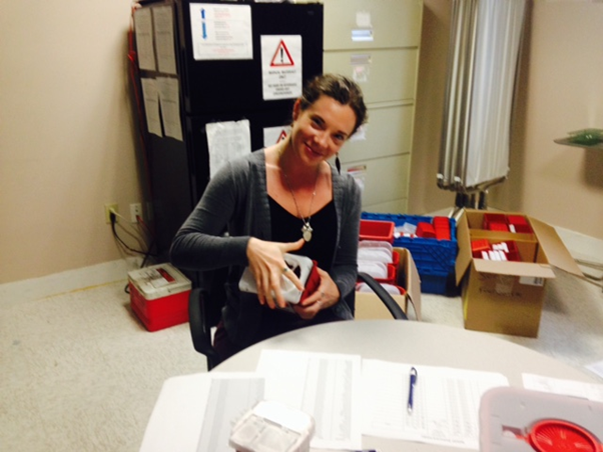
As part of my project for this Victor C. Alvarez Spark Innovation Award, I provided harm reduction services to injection drug users at the NOSAP (New Orleans Syringe Access Program) Needle Exchange. Through this award, I facilitated the safe disposal of used needles, and provided clean works (injection materials), in addition to developing a portable biohazard container distribution pilot project. I was inspired to do this project after my experiences volunteering at NOSAP. I saw first-hand how injection drug users are at special risk for contracting HIV and Hepatitis C, and for suffering other negative health effects from injection drug use. In addition to the risk of contracting chronic diseases through injection, injection drug users also face the risk of being infected through their transportation of used needles, including when transporting these used needles and works to needle exchanges. The health risks faced by injection drug users are compounded by their vulnerable position in society, highlighting the important need for health services for this population, and inspiring me to partner with NOSAP to support and expand the type of services offered by the NOSAP needle exchange. Those services include the safe disposal of biohazard material, distribution of clean injection material (including clean syringes and clean works), referral services, testing for HIV and Hepatitis C, and risk reduction counseling.

While working with injection drug users in New Orleans I learned about the complex risk factors experienced by this population and learned about some of the gaps in services. One of these gaps is the need for appropriate containers for disposal of used needles and other injection materials. Many clients came in with their used needles in plastic bags, in shoe boxes, or loose in bags or purses. Many clients would ask if we had containers to distribute, and ask if we knew where they could get them. During my experience volunteering, the need for portable biohazard containers surfaced again and again. In addition, many clients were unsure about the health risks of used injection materials that aren’t being used for injection (getting stuck with a needle or handling a used cooker). To address these needs, with the assistance of the Victor C. Alvarez Spark Innovation award, I expanded upon the previous volunteer work I did to develop a portable biohazard distribution pilot project. I conducted this project at the NOSAP needle exchange because I have a good relationship with this agency, and had volunteered with them for the past 3 years. However, more importantly, NOSAP is one of the few agencies in New Orleans (indeed in the south) that provided needle exchange services, making it an important community agency to partner with. NOSAP is currently the only needle exchange in the New Orleans area that offers regularly scheduled needle exchange hours, emphasizing the importance of the services provided by NOSAP for injection drug users in New Orleans. Since NOSAP depends upon volunteers to operate, this award allowed for the continued provision of these important services, and allowed for the expansion of the type of risk reduction activities offered.

After discussions with NOSAP staff and with our clients we purchased a few sample containers of a variety of sizes and then informally surveyed clients to see which sizes they would prefer. This also served to “prime” clients to the idea of portable biohazard containers and as a way for us to assess interest. When clients were on their way out of the exchange we would ask them which of the sizes we had on the table (we set up a small area to the side of the main table we use for the exchange) they would find most useful. The feedback we got from clients was very positive, with clients excited about the prospect of having containers.
We distributed containers in a room across the hall from the “regular” needle exchange services. Clients visited our room after they got what they needed from the exchange. Usually, a volunteer and I or staff member would be present in the room. I distributed four different sizes of waste containers to clients based on need (some clients act as informal needle exchanges for their communities and bring in thousands of needles each week, making a larger container appropriate for them). To date, we have distributed over 270 containers and will continue to distribute these containers and conduct trainings until we run out.

Multiple NOSAP participants have told me that without NOSAP they would be unable to get new needles and would have ended up sharing their needles with others. An additional gap in services that I’ve observed through working on this project is the need for overdose reduction services. Many of my clients told me stories about observing friends overdosing on opiates and feeling powerless to help their friends. Though I wasn’t able to participate in the roll-out of any Narcan-related services at NOSAP, I was able to hear first-hand from our clients how the city’s decision to provide Narcan over the counter at select pharmacies has contributed to saving many lives. No matter where I end up (whether in academia or working for health-related non-profits or community organizations), it’s important to me that I am able to be connected to the community around me and I am grateful for having had the support Victor C. Alvarez Spark Innovation Award to test this pilot project.
